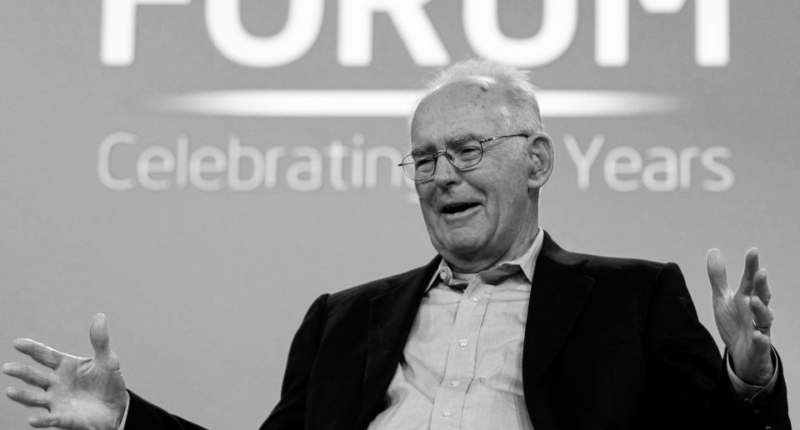Gordon Moore, co-founder of Intel Corporation and pioneer in the semiconductor industry, passed away at the age of 94. Moore’s prediction that computing power would increase steadily for decades, known as “Moore’s Law,” drove Intel and other chipmakers to aggressively target research and development resources to ensure that the trend continued. Moore’s Law not only created personal computers but also paved the way for the internet and Silicon Valley giants like Apple, Facebook, and Google. Moore was a passionate sport fisherman and started a foundation with his wife, Betty, in 2000 that focused on environmental causes. The foundation took on projects such as protecting the Amazon River basin and salmon streams in the United States, Canada, and Russia. He also gave hundreds of millions to his alma mater, the California Institute of Technology, and backed the Search for Extraterrestrial Intelligence project known as SETI. Moore’s legacy as an engineer, co-founder of Intel, and philanthropist will continue to inspire future generations of technology leaders.
The Passing of Gordon Moore: Intel Co-founder and Computing Pioneer
Gordon Moore, co-founder of Intel Corporation and pioneer in the semiconductor industry, passed away on Friday at the age of 94. Moore was not only an accomplished engineer, but also the author of “Moore’s Law,” which predicted a steady upward curve in computing power for decades.
Moore co-founded Intel in 1968, along with two other technology luminaries, and played a key role in putting “Intel Inside” processors in more than 80 percent of the world’s personal computers. He died surrounded by his family at his home in Hawaii, according to a statement from Intel and Moore’s family philanthropic foundation.
In 1965, Moore wrote an article where he observed that the number of transistors on microchips had roughly doubled every year since integrated circuits were invented a few years before. He predicted that the trend would continue, which became known as “Moore’s Law.” This prediction helped drive Intel and rival chipmakers to aggressively target their research and development resources to ensure that the rule of thumb came true.
Moore’s Law not only helped create personal computers but also paved the way for the internet and Silicon Valley giants like Apple, Facebook, and Google. Moore’s article led to chips becoming more efficient and less expensive at an exponential rate, allowing for much of the world’s technological progress for half a century.
Despite recent claims by Intel’s rivals that Moore’s Law no longer holds, current CEO Pat Gelsinger believes it still does, as the company invests billions of dollars in a turnaround effort. Morris Chang, the founder of Taiwan Semiconductor Manufacturing Co Ltd (TSMC), the world’s largest contract chipmaker, said in a statement released via TSMC that “almost all of my first-generation semiconductor colleagues are gone” with Gordon’s passing.
Moore’s contributions to the semiconductor industry and his prediction in “Moore’s Law” have been essential in driving technological progress forward for decades. His passing is a great loss to the industry and serves as a reminder of his immense impact.
The Legacy of Gordon Moore: Intel Co-founder and Philanthropist
Gordon Moore, co-founder of Intel Corporation and author of “Moore’s Law,” passed away at the age of 94. Despite being a pioneer in the semiconductor industry and predicting the rise of personal computers, he did not purchase a home computer until the late 1980s. Moore earned a Ph.D. in chemistry and physics in 1954 at the California Institute of Technology and worked at the Shockley Semiconductor Laboratory, where he met future Intel co-founder Robert Noyce. In 1968, Moore and Noyce left Fairchild to start the memory chip company soon to be named Intel.
Moore and Noyce’s first hire was another Fairchild colleague, Andy Grove, who would lead Intel through much of its explosive growth in the 1980s and 1990s. Moore was the person who spent countless hours tweaking transistors and refining Noyce’s broad and sometimes ill-defined ideas, efforts that often paid off. Grove filled out the group as Intel’s operations and management expert. Under their leadership, Intel invented the microprocessors that would open the way to the personal computer revolution. Moore was executive president until 1975, and from 1979 to 1987 he was chairman and CEO. He remained chairman until 1997.
In 2023 Forbes magazine estimated his net worth at USD 7.2 bn. Moore was a passionate sport fisherman and started a foundation with his wife, Betty, in 2000 that focused on environmental causes. The foundation, which received funding from Moore’s donation of some USD 5 bn in Intel stock, took on projects such as protecting the Amazon River basin and salmon streams in the United States, Canada, and Russia. He also gave hundreds of millions to his alma mater, the California Institute of Technology, to keep it at the forefront of technology and science, and backed the Search for Extraterrestrial Intelligence project known as SETI.
Moore received a Medal of Freedom, the nation’s highest civilian honor, from President George W. Bush in 2002. He and his wife had two children. Moore’s legacy as an engineer, co-founder of Intel, and philanthropist will continue to inspire future generations of technology leaders.
Don’t miss interesting posts on Famousbio

